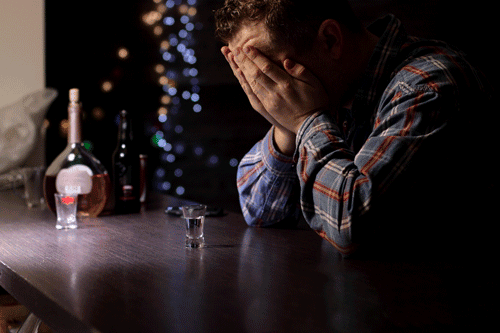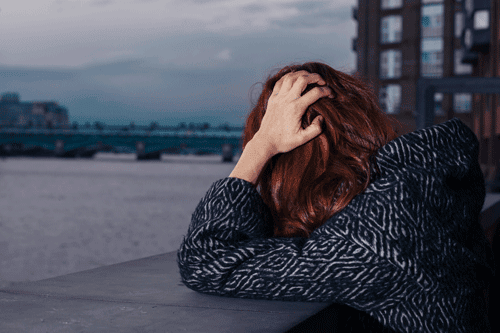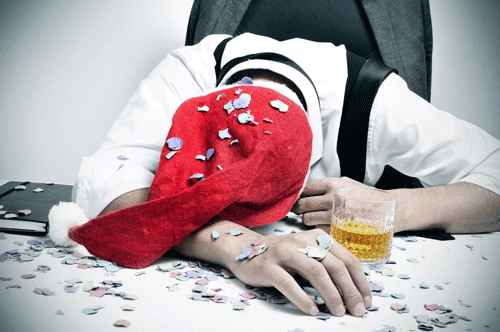Drinking More During Fall and Winter Months
Does it seem like you drink more during the fall and winter months?
If it seems like you’re drinking more now that summer is over, you might be onto something. With shorter days, bad weather, stressful holidays and alcohol-laden parties, it makes sense that alcohol is looking more attractive these days. While it’s important to notice whether alcohol is becoming more of a problem for you, it’s even more important to know what you can do if you think you have a problem.
Defining Problematic Drinking

The National Institute on Alcohol Abuse and Alcoholism (NIAAA) defines drinking as follows:
Moderate drinking is 1 drink per day for women and 2 drinks per day for men.
Binge drinking is engaging in drinking that brings the blood alcohol content (BAC) at or above .08% (usually 4 or more drinks in a 2-hour period for women and 5 or more drinks in the same period of time for men).
Heavy drinking is defined as drinking 5 or more drinks per day on 5 or more days of the week for both men and women.
It’s important to note, however, that it is not just these guidelines that determine whether someone has a problem with alcohol. If you drink, even one drink, when you shouldn’t, or the cost of drinking is outweighing the benefits, or if you otherwise feel your drinking is problematic, it might be time to assess whether you’d be better off without alcohol.
Alcohol treatment in southern California, free benefits check – click here.
Drinking Away Those Winter Blues
Drinking more during the fall/winter months could be a result of several factors: the shorter days, inclement weather and all the stress and booze which are both synonymous with the fall/winter holiday season.
Shorter Days, SAD and Increased Alcohol Use

Just as with depression brought on by any other cause, it is thought that a good number of individuals self-medicate these feelings with substances. In fact, studies have shown that 20% of those who suffer from depression self-medicate with drugs and/or alcohol. If you’re finding that your mood is shifting and your alcohol intake is increasing, SAD could be a factor.
What you can do:
- Increase exposure to bright lights – keep blinds open, move your desk near a window, try light therapy, or anything else that will expose you to bright lights.
- Take a vacation – Planning a trip to an area with milder weather and brighter sun (think Southern California, Florida or even the Caribbean!), can help you get the light you need.
- Get more Vitamin D – Vitamin D plays an important role in our overall mental well-being, and the sun is a major source of it. If you can’t get what you need from the sun, try adding some Vitamin D-rich foods to your diet, or even some supplements.
- Anti-depressants are another option. You and your Psychiatrist can decide whether this is the right option for you.
- Reduce your drinking – Although you’re drinking to eliminate your discomfort, your alcohol use could actually be making it worse. Alcohol is a depressant, and if you’re using it to medicate depression, it’s actually working against you.
- If you think you might have a problem with alcohol, and are feeling overwhelmed by depression and anxiety, you might consider looking into dual diagnosis treatment. Providers who specialize in treating dual diagnosis are trained to treat both the substance abuse and the underlying causes, such as anxiety and depression, which has been shown to be an effective approach.
Boredom, Isolation and Increased Alcohol Use
In many U.S. cities, fall and winter put a stop to outdoor recreation, hobbies and activities. Cold weather, storms and shorter days can keep people huddled up inside, sometimes for days on end, which can lead to hefty doses of boredom and isolation.
Boredom and alcohol use go hand in hand, as do isolation and alcohol use. A quick search on Google for “alcohol use and boredom” or “alcohol use and social isolation” will turn up no shortage of articles and blogs, listing the reasons people both start, and continue, to drink.
If you’re turning to alcohol to cope with feelings of boredom and isolation, it’s time to address these deeper issues. Learning healthier ways to deal with the underlying feelings will help you combat the alcohol use.
Get help and be home in time for the holidays. Learn more.
What you can do:
- Find indoor hobbies and activities you can do until the weather is better – Keeping your mind active and focused on something non-alcohol-related is a good way to reduce drinking.
- Invest in a home gym, or even just a treadmill – Staying active not only boosts your mental health, but fills the time you might otherwise drink. Make a goal to get in the best shape of your life over the next few months (which is hard to do if you’re drinking too much).
- Get outside any chance you get – If you drink to stave off cabin fever, get outdoors as much as you can!
- Keep in touch with friends and family – We tend to hibernate during fall and winter months and socialize less. Make it a point to keep in touch, even when you don’t really feel like it. Social support can be a major factor in managing addictive behavior and the added accountability can provide some extra motivation not to drink.
- Address the reasons you drink when you are bored. This could be the sign of an underlying issue and reliance on alcohol to cope.
Holiday Drinking
Another reason we see a sharp increase in alcohol use this time of year is that these months bring on the stressful, alcohol-laden holidays. Family drama and an endless calendar of events and parties can lead to excessive alcohol use.
Family Drama
The holidays can be a great time for visiting friends and family. Catching up and spending time with loved ones can be just what we need after limited time to visit during the year. Or, it could be the exact thing we’ve worked to avoid. Let’s face it: the holidays can mean obligatory visits with people we intentionally choose to keep at a distance. Something about the holidays though… the guilt we’d feel if we missed Thanksgiving dinner, or Christmas, or Hanukkah, or any other holiday we celebrate. This is a time for family and friends, and we often feel obligated to spend time with them, even when they don’t make us feel great.
So we drink. We drink to have more fun, to numb ourselves during uncomfortable visits, or even to kill the boredom. As the season continues on, the more gatherings there are, the more we drink, and before we realize it, we’re relying on alcohol just to get through the season.
What you can do:
- Give yourself permission to decline invitations – Just because someone is family, or is expecting you to attend an event, doesn’t mean you have to go. If the stress of being around people who bring you down makes you want to drink more, do what you need to do to take care of you.
- Find something to look forward to – If you do end up (reluctantly) with a spot at the table this year, think ahead about how you can enjoy yourself – without increased alcohol use. For example, you’ll most likely be happy to see at least one other person there – focus on connecting with them.
- Bring some support – Bring someone (preferably not a heavy drinker) who can help you navigate uncomfortable situations (without relying on alcohol).
- If relationships with certain people make you feel like drinking, you might want to explore the reasons why. A good therapist or even alcohol treatment center will be able to explore this with you. Get to the bottom of why you’re using alcohol to cope and why this particular relationship is a trigger for you.
Time to Party

If you find the holiday parties are giving you a reason, or even excuse, to drink more, or if your drinking is putting you in situations which are embarrassing or unsafe, it might be time to take a time out and assess your drinking behavior.
What you can do:
- Attend fewer parties – It’s simple: if you drink more when you’re at parties, don’t go to as many parties.
- Limit the alcohol you consume – Aim to keep your drinking to a moderate level. Figure out what that is before the party/event, then stick to it!
- Explore what your triggers are in social situations – Do you tend to go overboard with your drinking when you’re at a party? Why?
- Assess the cost of your drinking – Do you tend to find yourself in dangerous or embarrassing situations when you’re drinking? If the answer is yes, explore the reasons why. If you continue to drink despite the costs, you might want to reach out for help.
Get help now and be home in time for the holidays.
When Is Drinking a Problem?
So what does all this mean? For some, it’s just a reminder to keep the drinking in check. For others, the increased drinking signifies a problem that needs to be addressed.
If you find yourself back here every year, thinking, “How did I get here again?” you might want to seek help. If the consequences of your drinking are causing a great deal of strain for you, yet you continue to drink, then this would be a good reason to look into getting some help as well.
Worth Investigating:
If you’re drinking more during the fall and winter months, it’s possible you turn to alcohol to cope with uneasy feelings, situations and environments. Even if this is the only time of year you rely on alcohol to cope, it’s important to look at (and address) that. And whether it really is only this time of year (rather than the whole year through) that you tend to abuse alcohol is a question only you can answer, and you must do so honestly.
If you think you might have a problem with alcohol, it’s important to remember there are many resources for you. Depending on the severity of the problem, the first step might be to reach out to someone who is trained in treating addiction. Choose what works for you, whether it’s a support group, inpatient rehab, outpatient rehab, detox center, relying on family, or anything else that helps you make healthy decisions.
You can’t control the weather, the holidays, or the season, but you can certainly control how you experience this time of year. Don’t be afraid to reach out if you need help – you deserve brighter days and a season full of meaning and hope.
